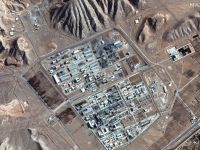Alarm bells are ringing in Jordan over an ambitious government plan to turn the southern Red Sea port of Aqaba into a duty-free special economic zone capable of drawing millions of dollars in investment.
The project calls for launching, in 2001, a low-tax economic zone to attract six billion dollars from tourism, information technology firms, industry, commerce and services, create 70,000 jobs and help double per capita income by 2020.
A special authority will administer the new zone, where sales taxes will be lowered to between zero and five percent compared to around 13 percent in the rest of the kingdom.
Opponents say it will turn Aqaba into a self-rule haven for money-launderers, smugglers and moral corruption.
Aqaba's proximity to Israel is also fanning passions with many Jordanians worried that Israelis will buy land under the cover of foreign investors.
"Aqaba is very sensitive. It shares borders with Israel and Saudi Arabia. It is our only port. We cannot play games or take risks with it," economic analyst Fahed al-Fanek told AFP.
Fanek, echoing several MPs and analysts, expressed concern that custom-made legislation for Aqaba within defined boundaries will undermine sovereignty, consecrating "Aqaba's separation from the rest of Jordan."
Deputy Salameh Hiyari is more blunt. "It is as if we will set up a state within a state," he said, also voicing concern that gambling casinos will mushroom in Aqaba and upset Jordan's conservative Muslim society.
But Deputy Prime Minister Mohammad Halayka and his associates on a task force appointed by King Abdullah II to carry out this mission strongly refute suggestions that Aqaba will fall prey to evil.
"Jordan's sovereignty in Aqaba will not be undermined in any way. We are only trying to find an engine to create economic growth... attract foreign investment and create jobs to overcome unemployment and poverty," Halayka said.
With seven billion dollars in foreign debt, high unemployment, and around 40 percent of the five-million-population living beneath the poverty line, Jordan is in dire need of an economic boost.
Halayka is a former secretary general of the trade ministry and led Jordan into the World Trade Organization this year after tough negotiations. Abdullah decorated him for his efforts. He remains confident in his new venture.
"Investors come to a region wanting an easy export route, water, manpower, infrastructure, good living conditions and easy investment procedures. Aqaba is the only place in Jordan with those conditions," he explains.
Legal safeguards have been drawn up to monitor the sale of land only to investors rather than foreign settlers and the government is determined "to preserve Jordan's moralistic values and Arab and Islamic culture".
"There won't be any investment without scrutiny or controls," he said.
Jordan's Customs chief Khaled Wazani told AFP that port revenues from Aqaba will continue to directly feed the national treasury and will even grow.
"Economic benefits will be much higher because activity at the container port will develop under the action plan, with tourism taking up 50 percent of overall activity, services 30 percent and industries 20 percent," Wazani said.
Last week the government passed its first hurdle when a joint committee of parliament's legal and economic commissions endorsed the draft plan for Aqaba and submitted it to parliament for approval - AMMAN (AFP)
© 2000 Al Bawaba (www.albawaba.com)







